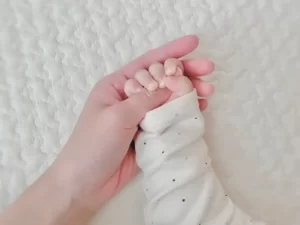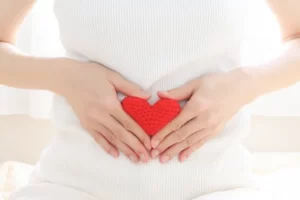Down syndrome is a congenital disease caused by trisomy 21, which results in an extra chromosome 21, and is the most common genetic disease in newborns. When you hear of a congenital disease, many people think that it is a disease that is inherited from the parents, but in reality, there are cases where the parents have some kind of genetic abnormality and it is inherited, and there are also cases where the parents have some kind of genetic abnormality and it is inherited. Mutations can cause genetic abnormalities in children. Which type of congenital disease is Down syndrome?
What is Down syndrome
General Down syndrome is explained in detail in “What is Down syndrome” article Please refer to that, but I will also briefly explain it here.
Human genes are made up of 46 chromosomes, and there are 23 pairs of two chromosomes, one inherited from the father and one inherited from the mother. Down syndrome is caused by a condition called “trisomy” in which the 21st chromosome, the 21st chromosome, has three copies instead of two (referred to as “trisomy 21”). The main symptoms of Down syndrome include a characteristic facial appearance in which the eyes are set far apart and slightly slanted, muscle weakness, developmental delays, and heart complications.

Causes of chromosomal abnormalities
Chromosome nondisjunction
How does the chromosomal abnormality that causes Down syndrome occur?
The number of chromosomes contained in human sperm and eggs is reduced by half from 23 pairs to 46 chromosomes during cell division, to 23 chromosomes by selecting one chromosome from each pair. (called “meiosis”). Then, when a sperm with 23 chromosomes and an egg are fertilized, the number of chromosomes becomes 46 again. In this way, children inherit 23 chromosomes from their father and mother, and maintain a total of 46 chromosomes.
However, during the meiosis process in which sperm and eggs are formed, for some reason, one chromosome 21 may not be selected and both chromosomes enter the sperm or egg (this is called “chromosome nondisjunction”). ). When a sperm or egg with such an abnormality fertilizes a normal sperm or egg, there will be 3 copies of chromosome 21 (2+1). It is thought that 90 to 95% of Down syndrome cases are caused by this chromosomal nondisjunction.
Down syndrome is a disease caused by a genetic abnormality, but if it is caused by chromosome segregation like this, it is not a problem in the genes of the parents that will be passed on to the child, but reproductive cells such as sperm and eggs. It is thought to occur due to “mutation” during growth. Therefore, even if the parents do not have the genetic abnormality, there is a certain probability that a child will be born with Down syndrome. The possibility of this chromosomal nondisjunction is thought to increase as the mother ages (“Identified the cause of age-related abnormalities in the number of egg chromosomes: RIKEN”).
Chromosomal translocation
Although it is less common, the remaining 5% of cases of Down syndrome are known to be caused by chromosomal translocations.
There are two main types of “translocations”: “reciprocal translocations”, in which parts of chromosomes are swapped with each other, and “Robertsonian translocations”, in which the long arms of different chromosomes are joined together. “there is.

Robertson translocation
The most commonly reported cause of the translocation type of Down syndrome is the Robertsonian translocation, where the long arm of chromosome 21 joins the long arm of chromosome 14. In “Robertson translocation”, the short arm of the chromosome disappears and the long arms are joined together, but because there are no important genes on the short arm, even if you have “Robertson translocation” There are no symptoms. If there is a chromosomal abnormality but there are no symptoms and the appearance is normal, it is called a “balanced type”, but a “Robertson translocation” is a “balanced type” chromosomal translocation; People who have it are called “carriers.” Conversely, chromosomal abnormalities that cause symptoms are called “unbalanced”.
A “carrier” of “Robertson translocation” has the long arm of chromosome 14 and chromosome 21 joined, so the total number of chromosomes is 45, one less than the normal number. I am. Therefore, the pattern of meiosis that produces sperm and eggs is more complex than normal, and there are six types: a normal combination, a “balanced type,” and four types of “unbalanced types.” By fertilizing these with sperm and eggs made from normal chromosomes, six types of fertilized eggs may be produced.
A normal combination produces a normal fertilized egg, and a fertilized egg from a “balanced type” becomes a “carrier” of the “Robertsonian translocation.” The four types of “unbalanced types” include trisomy 14, monosomy 21, and monosomy 14, in addition to trisomy 21, which causes Down syndrome, but trisomy 21 is fatal. It is a chromosomal abnormality that can lead to miscarriage. As a result, a child will be born that is either normal, a “carrier” of “Robertsonian translocation,” or a child with trisomy 21 translocation.
In this way, Down syndrome can also be caused by inherited chromosomal translocations. The actual probability that a child of a mother who is a carrier of Robertson’s translocation will have Down syndrome is about 1/10, and if the father is a carrier, the probability is about 1/20. It is considered to be a degree.
Test for translocation
If a translocation is suspected after repeated miscarriages and chromosomal analysis of the miscarriage villi is suspected, chromosomal testing of the couple may be considered. Also, if one of the parents is known to be a “carrier” of the “Robertson translocation”, Noninvasive prenatal genetic testing (NIPT)
Even when performing in vitro fertilization, PGT-SR (preimplantation genetic testing for structural rearrangement) may be indicated as a preimplantation diagnosis.

Mosaic type
The rarest type of Down syndrome is called mosaic type (approximately 1% of all cases). Earlier, we explained chromosome nondisjunction that occurs during the meiosis stage when sperm and eggs are formed before fertilization, but here, chromosome nondisjunction occurs during the early stage of cell division of the fertilized egg after fertilization, and 21 It occurs when there are three chromosomes. This type is not inherited from both parents, but is due to a “mutation.”
However, as the word “mosaic” suggests, it is a mixture of normal cells and trisomy 21 cells, and if the proportion of normal cells is high, symptoms may be alleviated.
Summary
The causes of the chromosomal abnormality called trisomy 21, which is associated with the onset of Down syndrome, include chromosomal nondisjunction and translocation that occur during the formation of sperm and eggs, and chromosomal aberration that occurs during the cell division process of fertilized eggs. There are three possibilities: mosaic type due to separation. Down syndrome, which is caused by chromosomal nondisjunction, is a mutation and can occur even if both parents have normal chromosomes. On the other hand, Down syndrome, which is caused by a chromosomal translocation, does not occur as frequently as 5% of all Down syndrome cases, but it is caused by inheritance from parents who are carriers of the Robertsonian translocation.
Article Editorial Supervisor

岡 博史先生
【役職】
【資格】
【略歴】
【所属】
【SNS】
 中文
中文











